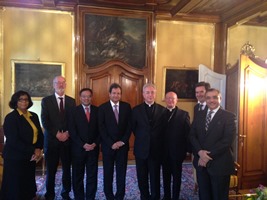

The ceremonial opening of the Buddhist Centre in the “House of Religion” in Bern , Switzerland was held on 14th December 2014, following the opening of the “House of Religion”, which is an intercultural and interreligious centre accommodating places of worships for number of other religions including Hinduism, Islam, Christianity, etc.
The Buddhist Centre will provide an opportunity to the followers as well as the community interested in Buddhism to exchange their views on Buddhism, engage in Dhamma discourse and to practise meditation.


Sri Lanka pledged a voluntary contribution of 10,000 US$ towards the UNHCR Global Appeal 2015 at the UNHCR Pledging Conference held on 09th December 2015. The Global Appeal 2015 Update by the UNHCR presented the financial resources that will be required in 2015 which amounts to US $ 6.23 Billion, to protect and improve the lives of millions of people, including, refugees, internally displaced people, returnees, stateless people, and others of concern.

Ambassador Ravinatha Aryasinha met Archbishop Dominique Mamberti, the Secretary for Relations with States of the Holy See at a luncheon meeting on 6th December 2014 in Bern. The luncheon meeting was organized by Monsignor Diego Causero, Ambassador of Holy See in Bern for diplomats accredited to the Holysee, on the occasion of Archbishop Mamberti’s visit to Switzerland.

A series of initiatives aimed at boosting protection and improving conditions of employment for millions of foreign workers in the Gulf have been agreed upon at the Third Ministerial Consultative Meeting of the Abu Dhabi Dialogue (ADD) comprising Asian countries sending and receiving labour, which concluded in Kuwait last week. The 'Kuwait Declaration' noted that "recognizing that individual government's efforts may fall short, we resolve to work together to prevent and sanction exploitative recruitment practices that place workers at great risk and undermine fundamental rights".
Ministers and Heads of Delegations from Afghanistan, Bahrain, Bangladesh, China, India, Indonesia, Kuwait, Nepal, Oman, Pakistan, the Philippines, Qatar, Saudi Arabia, Sri Lanka, Thailand, United Arab Emirates and Vietnam attended this meeting, held on 26-27 November 2014 under the chairmanship of Kuwait. Sri Lanka's Permanent Representative to the United Nations in Geneva Ravinatha Aryasinha led the Sri Lanka delegation.

Sri Lanka stated that a comprehensive labour migration policy has been developed, with a view to managing labour migration properly and orderly and to ensure dignity, security and equity for Sri Lankan nationals seeking employment abroad. The Government of Sri Lanka has taken concerted efforts in several policy key areas, namely, improving recruitment practices and educating labour agents, pre-departure orientation, empowerment of those migrants who have re-entered the country, facilitating cheaper, faster, and safer transfer of remittances.

Sri Lanka’s renowned tourist attractions and its finest teas were in focus at the National Stall set by the Permanent Mission of Sri Lanka to the United Nations, Geneva at the United Nations Women’s Guild Bazaar held on Tuesday, 18 November 2014 at the Palais des Nations.

Sri Lanka’s renowned tourist attractions and its finest teas were in focus at the National Stall set by the Permanent Mission of Sri Lanka to the United Nations, Geneva at the United Nations Women’s Guild Bazaar held on Tuesday, 18 November 2014 at the Palais des Nations.
- Sri Lanka reiterates its support for the adoption of a Declaration on Rights of Peasants and Other People Working in Rural Areas
- GOSL responds to News Release by the UN OHCHR
- Sri Lanka emphasizes commitment to address the issue of 'ethical labour recruitment practices' during its tenure as Colombo Process Chair
